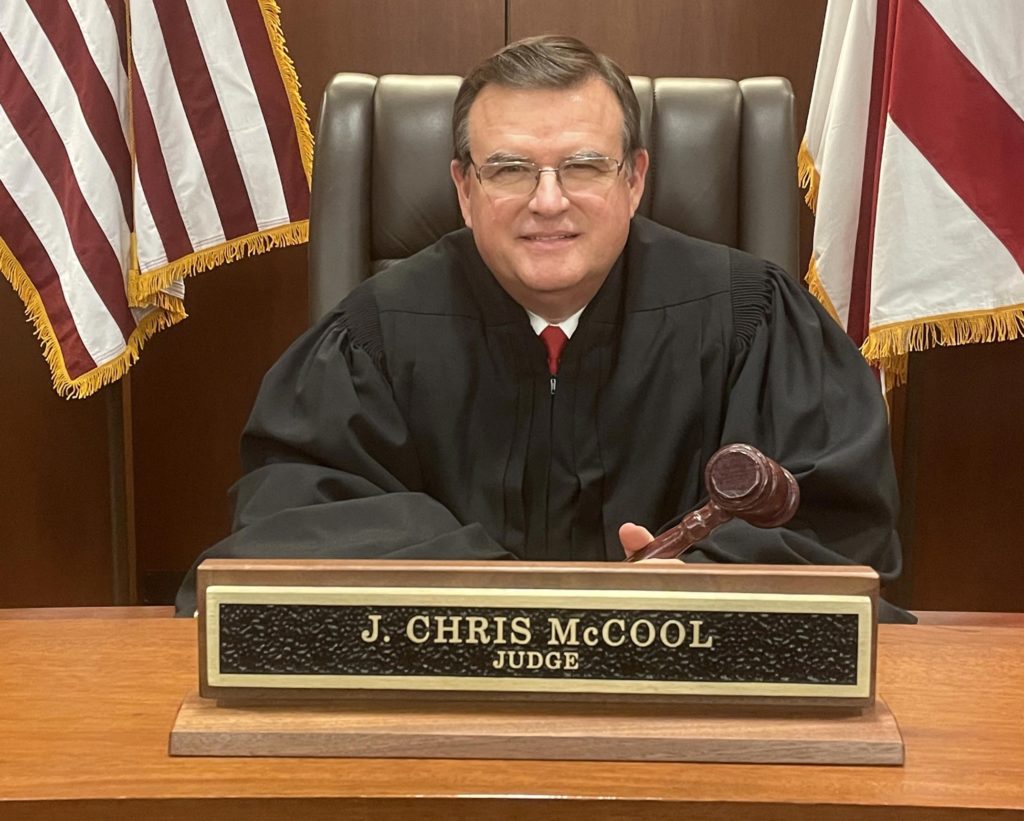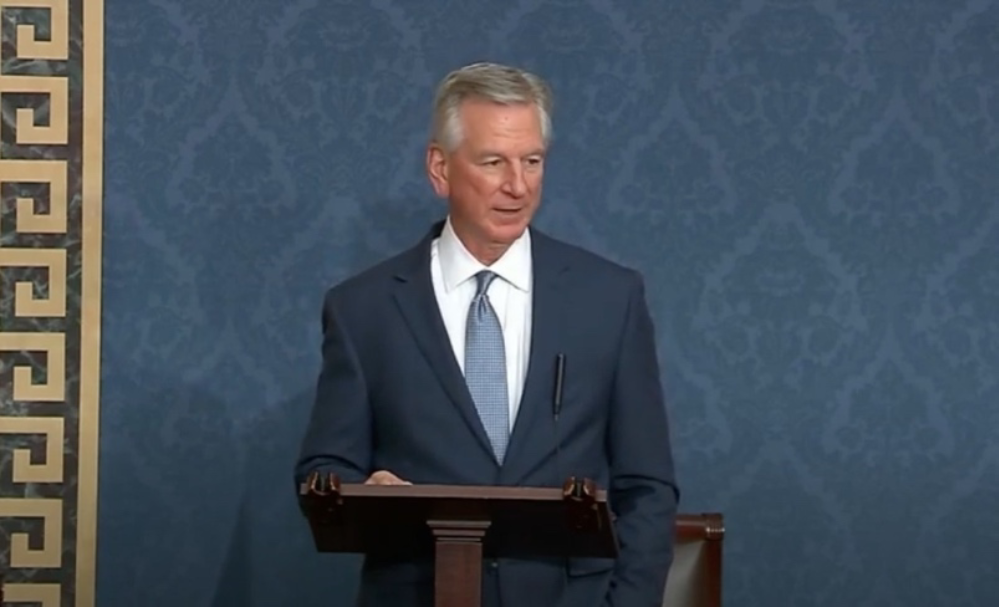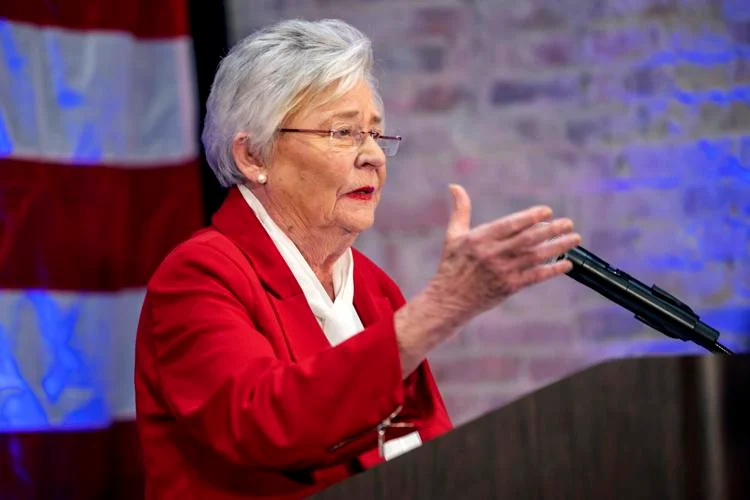Chris McCool announces candidacy for Alabama Supreme Court

Alabama Court of Criminal Appeals Judge Chris McCool announced Wednesday that he will seek the Republican Party nomination for an open seat on the Alabama Supreme Court in the March 2024 primary election. “My nearly three decades of legal experience as a lawyer, prosecutor, and judge have reinforced my great reverence for the Rule of Law,” McCool said. “My more than half a century of life experience has taught me that there is no substitute for integrity. ‘Character’ is not something you can teach in school – I learned that growing up on my daddy’s cattle and chicken farm and in working hard to provide for my family through the years.” Judge McCool was elected as a Republican in November 2018 for a six-year term in the Alabama Court of Criminal Appeals. McCool is a longtime district attorney. McCool practiced law for two years in his hometown of Gordo and worked for nearly 24 years as a prosecutor, serving the people of the 24th Judicial Circuit as District Attorney from 2001 until 2018. “I have always been a conservative,” McCool stated. “We need someone with common sense and conservative values to serve on the Alabama Supreme Court. My experience and my judicial philosophy make me ready for the job.” “As a Republican, I do NOT believe in judicial activism. Judges should apply the law and not create the law. Public policy should be set by the Legislature, and our court system should enforce it, not make it! I firmly believe that judges should not be legislators in black robes.” Judge McCool has a bachelor’s degree from the University of Alabama and a law degree from the University of Alabama School of Law. He and his wife Sherri live in Gordo, where they have raised four children. McCool has been the pastor of Zion Primitive Baptist Church since 2012. While Alabama does not have judicial term limits, judges cannot serve past age 70 – including on the Alabama Supreme Court. Alabama has partisan elected judges. All of the appellate court judges in Alabama are Republicans. To connect with the author of this story, or to comment, email brandonmreporter@gmail.com.
Alabama Trustees approve more funds for the Bayfront Park Restoration and Improvement

The Alabama Trustee Implementation Group has approved using earned interest for the Bayfront Park Restoration and Improvement – Phases IIa and IIb Project (Bayfront Park project). The Bayfront Park project will provide enhanced recreational opportunities and benefit sea birds. This project includes shoreline stabilization, Americans with Disabilities Act-compliant parking, a pavilion, restroom facilities, and other park improvements. The additional funding was necessary. In the three years since the original budget estimate was created for the project, construction costs have increased dramatically and in an unprecedented manner. Additionally, environmental compliance work over and above what was initially anticipated was required. This delayed implementation and further increased project costs. The Bayfront Park project was approved in the Alabama Trustee Implementation Group Restoration Plan III and Environmental Assessment: Provide and Enhance Recreational Opportunities; and Birds (RPIII/EA), which was publicly released on December 20, 2019. This project includes shoreline stabilization, Americans with Disabilities Act-compliant parking, a pavilion, restroom facilities, and other park improvements. The original project budget was $4,683,304. Work began on the project in early 2022, and to date, the shoreline stabilization work has been completed. The project engineer’s estimate of the increased costs is $3,884,081. The new budget for the Bayfront Park project is $8,567,385, of which $991,723 will be funded from earned interest. With this additional funding, each of the original project elements will be completed. The Alabama Trustee Implementation Group hopes to complete the construction of this project in 2023. The funds are from the settlement from the April 20, 2010, Deepwater Horizon disaster. After the mobile drilling unit exploded, caught fire, and eventually sank in the Gulf of Mexico. This released 3.19 million barrels of oil and natural gas from the BP Exploration and Production, Inc. (BP) Macondo well, causing extensive natural resource injuries. Initial efforts to cap the well following the explosion were unsuccessful. For 87 days after the explosion, the well continuously and uncontrollably discharged oil and natural gas into the northern Gulf of Mexico. Oil spread from the deep ocean to the surface and nearshore environment from Texas to Florida, impacting the Alabama Gulf Coast. Natural resources impacted included: deep-sea coral, fish and shellfish, productive wetland habitats, sandy beaches, birds, sea turtles, and other protected marine life. The DWH oil spill prevented people from fishing, going to the beach, and enjoying typical recreational activities along the Gulf of Mexico. The DWH oil spill was subject to the provisions of the Oil Pollution Act (OPA) of 1990, which addresses preventing, responding to, and paying for oil pollution incidents in navigable waters, adjoining shorelines, and the exclusive economic zone of the United States. Under the authority of OPA, a council of federal and state “Trustees” was established on behalf of the public to assess natural resource injuries resulting from the incident and to work to make the environment and public whole for those injuries. As required under OPA, the Trustees conducted a natural resource damage assessment (NRDA) and prepared the Final Programmatic Damage Assessment and Restoration Plan/Programmatic Environmental Impact Statement (Final PDARP/PEIS). The Alabama Trustee Implementation Group includes two state trustee agencies and four federal trustee agencies: the Alabama Department of Conservation and Natural Resources (ADCNR); the Geological Survey of Alabama; the United States Department of Commerce, represented by the National Oceanic and Atmospheric Administration (NOAA); the United States Department of the Interior (USDOI), represented by the United States Fish and Wildlife Service (USFWS), Bureau of Land Management, and National Park Service; the United States Department of Agriculture(USDA); and the United States Environmental Protection Agency (USEPA) (collectively the AL TIG). To connect with the author of this story, or to comment, email brandonmreporter@gmail.com.
Unemployment assistance is available to workers in Autauga and Dallas Counties

Alabama Department of Labor Secretary Fitzgerald Washington announced on Tuesday that workers who became unemployed due to severe storms, straight-line winds, and tornadoes in Autauga and Dallas Counties may qualify for unemployment assistance. President Joe Biden designated the area as a natural disaster area. Because of that, residents who became unemployed due to severe storms, straight-line winds, and tornadoes during the period of January 12, 2023, may be eligible for assistance under the Disaster Unemployment Assistance (DUA) program. “Generally, those who are eligible for state unemployment benefits are not eligible for DUA, but a claimant may qualify if state unemployment compensation benefits are exhausted,” said Washington. “If you believe you are entitled to these benefits, I urge you to file a claim to see if you are eligible.” Those who might be eligible for Disaster Unemployment Assistance include the following: · individuals who no longer have a job, are unable to reach the place of employment, or were scheduled to start work in the major disaster area and the job no longer exists · those who became the breadwinner or major support of the family because the head of household died · or those who cannot work because of an injury incurred during the major disaster. All of the previously described circumstances must be a direct result of the severe storms, straight-line winds, and tornadoes. Claims can be filed through the Alabama Department Of Labor website or by calling 1-866-234-5382. The deadline to file a DUA claim is February 16, 2023, for Autauga and Dallas Counties. To connect with the author of this story, or to comment, email brandonmreporter@gmail.com.
Tommy Tuberville releases video critical of Joe Biden’s border policy

President Joe Biden recently made his first visit to the southern border since assuming office. U.S. Senator Tommy Tuberville has visited the U.S.-Mexico border multiple times since taking office and released a video montage criticizing Biden’s border policies. “Either he is blind, or he doesn’t know what he is doing,” Tuberville said of the President’s failure to recognize the crisis at the border and the effects that that lawlessness is having on the country as a whole. Tuberville most recently visited the border in October 2022. During the visit, he met with men and women on the frontlines of the border crisis, including National Border Patrol Council President Brandon Judd and Del Rio Sector Chief Jason Owens. “I have spoken directly with the men and women at the border, and it has opened my eyes to what needs to be done to fix this crisis,” Tuberville said. “When the leadership of our own country ignores our own laws, people take advantage. The result is cartels exploiting our laws to smuggle humans, drugs, and other illicit materials across the border.” On his first day in office, President Biden ended the national emergency on the southern border, halted construction on the border wall, and weakened enforcement of our immigration laws by halting the deportation and detention of those who cross our border. Since then, more than four million illegal immigrants have been apprehended at our southern border — nearly the total population of Alabama residents. “President Biden made the radical decision to open our borders by undoing many successful policies put in place by the Trump administration that were working, and he changed them,” Tuberville said. “You can draw a straight line from those ill-advised policy decisions to where we are as we speak. When we allow people to continuously break our laws, we should not be surprised when more people join in. We should not be surprised when our laws no longer carry authority in our country.” In August 2022, President Biden followed through with a campaign promise to end the “Remain in Mexico” policy that mandates those requesting asylum in the United States stay in Mexico while their claims are processed. Recently, a federal judge delayed the repeal of the “Remain in Mexico” policy, finding that the Biden administration failed to include key considerations in the memo rescinding the policy. Biden has also attempted to end Title 42, which allows the immediate expulsion of illegal immigrants during a national health emergency and was enacted at the beginning of the COVID-19 pandemic. The Supreme Court blocked that effort before the policy was set to expire. U.S. Department of Homeland Security estimates that we could see upwards of 18,000 more illegal immigrant crossings per day should Title 42 be lifted. Biden has also recently announced a plan to provide an “app” to make it easier for illegal immigrants seeking asylum to schedule appointments with U.S. Customs and Border Protection (CBP), “They are bending to the pressure from the far left to abandon enforcement laws in this country and just look at where it has gotten us,” Tuberville said. “Yes, we need help. The border patrol needs help. ICE needs help.” Tuberville said that U.S. Customs and Border Protection officials told him that the new temporary processing facility in Eagle Pass, which was erected shortly after President Biden’s inauguration to alleviate overcrowding of apprehended illegal immigrants at border stations, costs American taxpayers $14 million per month. In 2021, the illegal immigrants apprehended at the southern border traveled from more than 160 countries. U.S. Sen. Katie Britt (R-Alabama) also recently visited the southern border. “What we witnessed these past 24 hours was gut-wrenching,” said Sen. Britt. “The raw numbers alone tell us that there is an unprecedented national security and humanitarian crisis at the southern border. However, seeing it up close was truly eye-opening, underlining the historic magnitude of the problem and giving faces to the very real human cost of the reckless policies that have caused this disaster. Tuberville is in his first term representing Alabama in the U.S. Senate. Tuberville lives in Auburn. Before his Senate service, Tuberville had a long, distinguished career in coaching, including as the head football coach at Auburn University. To connect with the author of this story, or to comment, email brandonmreporter@gmail.com.
Barry Moore appointed to House Judiciary Committee

Congressman Barry Moore was appointed to the House Judiciary Committee. Moore said that it was an “honor” to be appointed to serve on the “prestigious” committee. “It is a great and humbling honor to be appointed to serve on the prestigious House Judiciary Committee and serve alongside my friend and our chairman, Jim Jordan, to defend our foundational American freedoms,” said Rep. Moore. “The Judiciary Committee will be the tip of the spear this Congress fighting to ensure that the American people’s government works to protect their civil liberties, not undermine them to advance a political agenda. With President Biden in the White House, we have a big task ahead, but I’m ready to get to work.” Congressman Jordan is the Chairman of the House Judiciary Committee. “We’re excited to welcome all new and returning members of the House Judiciary Committee to the 118th Congress,” Chairman Jordan said in a statement. “House Judiciary Republicans are ready to get to work on the important issues facing the American people by passing legislation that will secure the southern border, investigating the weaponization of the federal government against the American people, and reining in Big Tech’s censorship of free speech.” Chairman Jordan sent letters on Tuesday to White House Chief of Staff Ron Klain, Attorney General Merrick Garland, FBI Director Christopher Wray, DHS Secretary Alejandro Mayorkas, Education Secretary Miguel Cardona, ATF Director Steve Dettelbach, and DEA Administrator Anne Milgram renewing outstanding requests for communications and documents. Jordan claimed that for two years, the Biden Administration has stonewalled Congress, refused to comply with basic document requests and avoided transparency and accountability for its failures. Jordan said that House Judiciary Republicans are committed to holding each agency accountable under the new majority and will use compulsory processes, if necessary, to get answers for the American people. “Since the beginning of the Biden Administration, we have made several requests for information and documents concerning the operations and actions of the Department of Homeland Security,” Jordan wrote in the letter to Mayorkas. “These requests remain outstanding. As we begin the 118th Congress, we write again to reiterate our outstanding requests and ask that you immediately comply in full.” Mayorkas faces heavy criticism from House Republicans for his handling of the southern border situation and the documented chaos there. “Mayorkas swore an oath to “well and faithfully discharge the duties of [his] office.” Look at the border and the terrible numbers on his watch,” Moore said on social media. “Can anyone make the argument he is discharging the duties of his office well? He has to go, and if Biden won’t hold him accountable, House Republicans must.” Moore was just re-elected to his second term representing Alabama’s Second Congressional District. Moore previously served in the Alabama House of Representatives from 2010 to 2018. He was elected to Congress in 2020, after his second run for office. Moore is a veteran. He owns a garbage collection business in Enterprise. He is a graduate of Auburn University. To connect with the author of this story, or to comment, email brandonmreporter@gmail.com.
Steve Flowers: Inauguration day

The Inauguration of our Alabama Constitutional officials was Monday. Our state constitution calls for the Inauguration to be held on the third Monday in January. As you would expect, and as Almanac suggests, it is usually a cold day. Over the years, I have had countless folks harken back to their high school band experiences of marching in the Inaugural Parade, especially ladies who had been majorettes. They had to march and twirl a baton in 20-degree weather with skimpy, legless, bathing suit style attire. It left them with a lasting indelible memory of an Alabama Gubernatorial Inauguration. Mind you, I was not there, but every old-timer who has talked politics with me over the years and who have seen a good many inaugurations, will remark that the January 1963 George Wallace’s initial inauguration as governor was the coldest. There was a lot of frostbite that day. However, the inaugural address from George C. Wallace was hot and heavy. That was the day that Wallace threw down the gauntlet and declared, “Segregation today, segregation tomorrow, and segregation forever.” That was exactly 60 years ago. A lot has changed since that day. It was during the Wallace era that the Civil Rights movement changed the political landscape of the nation and especially in the south. Wallace was an integral part of that historical era. He watched it all unfold from his Goat Hill office overlooking Dexter Avenue, and he was the reason for a lot of the bloodshed. Every time I see an inauguration on the Capitol steps, I reminisce about the history that has been made in that block of Dexter Avenue in Montgomery. The men who wrote Alabama’s overtly racist 1901 Constitution and the crowd that howled in defiance as Wallace made his 1963 declaration would marvel at the change and diversity of today’s Alabama. It is poetic and ironic that this year’s Inauguration Day, January 16, 2023, was on the same day as Martin Luther King Day, a state and national holiday. Kay Ivey grew up in the heart of the Wallace Era in Wilcox County. She cut her political teeth campaigning for the Wallaces. She was especially involved with Lurleen Wallace’s 1966 governor’s race when she was a student at Auburn University. After Auburn, she worked for a while in Banking and teaching in Mobile. She began her Montgomery career as the reading clerk in the Alabama House of Representatives under the tutelage of Speaker Joe McCorquodale. Black Belters, like McCorquodale, controlled the House and the Senate. Kay Ivey’s melodious, pronounced Black Belt accent drew folks’ attention to her reading even the most mundane legalese for hours on end. She later became associated with the Alabama Commission on Higher Education. As their Public Relations and Governmental Affairs Director, she learned the legislative process. She entered the political arena in 2002 when she was elected State Treasurer. She served eight years in that post. She was then elected Lt. Governor in 2010 and reelected in 2014. In the middle of her second term, she became Governor after Dr. Robert Bentley vacated the governor’s office. She served out the last 18 months of his term and was elected in her own right as Governor of Alabama in 2018. She was reelected, overwhelmingly, last year. If Kay Ivey finishes out this four-year term, she will have been Governor of Alabama longer than anyone else besides George C. Wallace. She is the first woman to be elected as a Republican. She is the second female governor, the first being her idol, Lurleen Wallace, 56 years ago. Also inaugurated with Governor Kay Ivey were Lt. Governor Will Ainsworth, Attorney General Steve Marshall, State Treasurer Young Boozer, Agriculture Commissioner Rick Pate, Secretary of State Wes Allen, and State Auditor Andrew Sorrell. Jeremy Oden and Chip Beeker were sworn in for four-year terms on the Public Service Commission. Two Supreme Court Justices, Kelli Wise and Greg Cook, were sworn in for six-year terms in a special investiture last Friday. Justice Kelli Wise was sworn in for her third term. She has served 12 years on the Supreme Court and was on the State Court of Criminal Appeals for a decade prior to being elected to the high court. Justice Greg Cook was sworn in for his initial term on the high tribunal. He is a well-qualified and conservative jurist who will fit in well on the Supreme Court. It was a big day in Alabama politics. See you next week. Steve Flowers is Alabama’s leading political columnist. His weekly column appears in over 60 Alabama newspapers. He served 16 years in the state legislature. Steve may be reached at www.steveflowers.us.
Kay Ivey signs executive orders promoting accountability

Alabama Gov. Kay Ivey wants greater transparency from the state’s government and signed three executive orders Tuesday to help start the process. The Republican governor, who was sworn in on Monday for her second term in office, signed orders that will establish standards for management of state agencies in the executive branch, create a task force to find efficiencies in state government and another that deals with the number of state vehicles. Executive Order 726 issued guidelines for the executive branch’s departments, such as the Department of Revenue, Alcoholic Beverage Control Board, and state law enforcement, requiring them to use state treasury accounts, handle consumer complaints, and when they can procure outside counsel. Executive Order 727 creates the Governor’s Study Group on State Government that will be chaired by state Treasurer Young Boozer. The group will aim to find solutions to the problem of recruiting and retaining government workers and the potential elimination and consolidation of state agencies. The group’s report will be due to Ivey on December 15. Executive Order 728 will require state agencies to have a written policy by July 1 for disposing of unnecessary state vehicles. Agencies will also be required to mandate policies for the use and issuance of state vehicles. The state motor pool maintained by the state Department of Transportation will also be eliminated under the order. According to the news release, Alabama has 9,500 state vehicles for 30,000 employees. Republished with the permission of The Center Square.
Parole denied for 90% of Alabama inmates, a new low

Seventy-one-year-old Leola Harris is confined to a wheelchair, must undergo dialysis three times a week, and is in end-stage renal failure, her attorney said. After serving 19 years of a 35-year murder sentence, the frail woman is not a threat to anyone and should be released to a nursing home to live out her final days, he argued. The Alabama Parole Board disagreed and last week denied her parole after a brief hearing. She won’t be eligible again until 2028. The rate of state inmates being granted parole in Alabama has plummeted to a new low, with 90% of eligible inmates being rejected last fiscal year, according to agency reports. Critics of the decline say the board is not following its guidelines, and denial has become the default decision. “This denial is an injustice and a waste of tax dollars,” said former Alabama Chief Justice Sue Bell Cobb, who now heads Redemption Earned, which represented Harris. The group is a nonprofit law firm that represents aged and ill inmates whom the organization determines are worthy of release. “They are supposed to ask if someone has been adequately punished. She’s 71 and has served 19 years, without violations in 12 years,” Cobb said. “Then the next question is: Do they pose a risk to public safety? The woman is in a wheelchair and cannot even go to the bathroom by herself. She’s dying, and they just denied her parole. It is an injustice. It is shameful.” Harris’ parole was opposed by Victims of Crime and Leniency, an advocacy group for victims and their families, and the state attorney general’s office. They argued against Harris’ release because she was convicted of murder. Harris was convicted of murder for the 2001 killing of Lennell Norris, who was found dead at her kitchen table. Harris testified at her trial that Norris was a friend who would often come by her house at night but maintained she did not shoot him and that someone else was in the house that night. The three-member board granted parole to 409 inmates and turned down 3,593 others in the fiscal year that ended September 30, according to records from the Alabama Bureau of Pardons and Paroles. The grant rate of 10% is a fraction of what it had been in previous years and comes after four straight years of decline. The rate was 31% in fiscal year 2019 before falling to 20% in 2020 and then 15% in 2021. Parole board Chairwoman Leigh Gwathney declined to comment to questions submitted through an agency spokesperson. State Rep. Chris England, who has called for changes on the board, argued political concerns are driving the limited releases. “Folks that are pushing this process where we don’t release anyone are more concerned with headlines than they are with public safety,” England, D-Tuscaloosa, said. Leah Nelson, research director at the legal nonprofit Alabama Appleseed Center for Law and Justice, said the state is creating “conditions for combustion” within prisons that the U.S. Department of Justice has said are already among the most violent in the country. “We have a parole board that evidently is finding that no one meets whatever standard it has in mind. No one has any hope. We have a despair machine,” Nelson said. In 2020, guidelines were put in place, including a scoring system, to determine if release is recommended. The board conformed to the guidelines about 30% of the time, according to state records. Cam Ward, executive director of the Alabama Bureau of Pardons and Paroles, said the guidelines are just that. “The law says it’s up to the board. They have total discretion,” Ward said. He cautioned about comparing parole rates to the years before 2019, because of sentencing changes. A horrific crime in north Alabama led to changes at Alabama’s parole board. In 2018, eight months after Jimmy O’Neal Spencer was released on parole, he was charged with killing three people, including a 7-year-old and his grandmother. In 2019, Alabama Gov. Kay Ivey signed legislation overhauling the board appointment process. “If these folks are upset about the number of inmates paroled, they should come every day and listen to the horrible crimes they committed. They would understand why these violent offenders should serve their sentence,” Janette Grantham, executive director of Victims of Crime and Leniency, wrote in an email. Alabama Attorney General Steve Marshall defended the low parole rate. “By law, the paramount duty of the board is to ensure public safety—not to appease the anti-incarceration community,” his office said in a statement released through a spokesman. Stacy George, a former corrections officer who has been outspoken about prison conditions, said he believes the board should hear from inmates directly, at least remotely via computer, and find out more about their circumstances. People eligible for parole in Alabama currently do not appear before the board. “There are people that never need to actually get out of prison, but there are people that do need to get out and get a second chance,” George said. Republished with the permission of The Associated Press.
Wes Allen announces withdrawal from voter registration group

Alabama’s new secretary of state, Wes Allen, announced the state’s withdrawal Tuesday from a 32-state voter registration partnership, a data-sharing effort that was designed to maintain accurate voter rolls but has sometimes become the target of conservative ire and conspiracy theories. A day after being sworn in, Allen sent a letter to the Electronic Registration Information Center, a non-profit linking 32 states and the District of Columbia, saying the state will no longer participate in the sharing of voter registration data. “I made a promise to the people of Alabama that ending our state’s relationship with the ERIC organization would be my first official act as Secretary of State,” Allen said in a statement. The letter said that Alabama would immediately cease transmitting data. The Republican, who had pledged during his campaign to withdraw from ERIC, cited privacy concerns Tuesday for the decision. “Providing the private information of Alabama citizens, including underage minors, to an out-of-state organization is troubling to me and to people that I heard from as I traveled the state for the last 20 months,” Allen said. The database was created as a tool to maintain accurate voter rolls and combat fraud by allowing states to know when someone moves, dies or registers elsewhere, but has sometimes been targeted by critics. In November, former Secretary of State John Merrill criticized Allen’s intent to withdraw. He said then that ERIC provides information that Alabama couldn’t otherwise access — such as other states’ voter registration and motorist driver’s license records — and has been a crucial tool for maintaining voting rolls. “I trust he has evaluated this situation and is making the decision based on what he believes to be in the best interest of the state of Alabama,” Merrill said on Tuesday. The issue of participation in ERIC was raised in at least one other state. The Republican candidate for Arizona secretary of state said during the campaign that he would withdraw from ERIC if elected, but he lost. Louisiana withdrew earlier this year. However, another Republican campaigned on joining the partnership. Georgia Secretary of State Brad Raffensperger, also a Republican, proudly noted in stump speeches that the state had joined ERIC. Raffensperger said in 2019 that it would be a tremendous step forward for the integrity of Georgia’s voter rolls. According to the organization, the states that currently participate in ERIC are Alabama, Alaska, Arizona, Colorado, Connecticut, Delaware, Florida, Georgia, Illinois, Iowa, Kentucky, Maine, Maryland, Massachusetts, Michigan, Minnesota, Missouri, Nevada, New Jersey, New Mexico, Ohio, Oregon, Pennsylvania, Rhode Island, South Carolina, Texas, Utah, Vermont, Virginia, Washington, West Virginia, and Wisconsin. The District of Columbia is also a member. Republished with the permission of The Associated Press.


